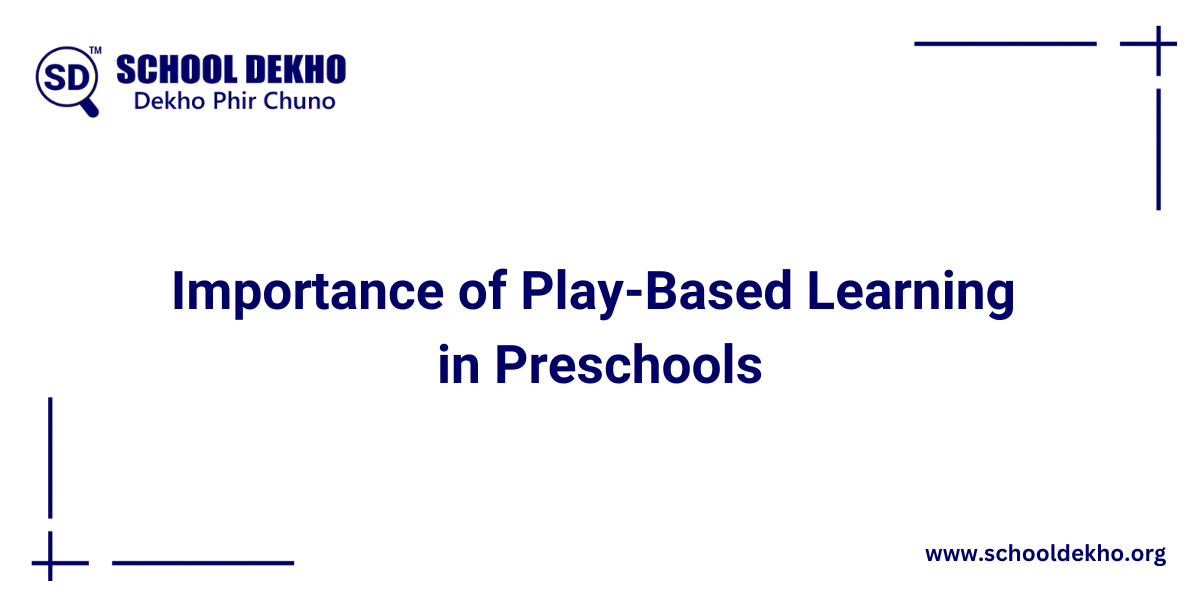
Importance of Play Based Learning in Preschools
It is a universal fact that children love to play. But do you know that playing is not just about having fun, it is also a great way for your children to learn. For growing children aged between 6 months to 5 years, play-based learning lays a foundation for their growth. It helps them develop essential life skills as they have fun.
Let’s understand what play-based learning is, what are the activities involved, and how it can benefit your child in daycare and preschool environments.
What is Play-Based Learning?
Play-based learning is a natural way of learning where children explore, learn, and interact while playing, rather than learning through strict instructions. Play-based learning is basically learning hidden in the fun. Whether your child is building with blocks or cooking in a toy kitchen, each activity comes with mental growth and creativity development. All while keeping them happy and involved.
Schools such as Klay Playschool and Daycare combine playing and learning in a balanced way. They help kids develop foundational skills through play-based learning, keeping them excited and engaged in a playful environment.
Types of Play-Based Activities
Play-based learning has many types, each targeting a specific aspect of your child’s development. Here are some activities that are most popular and how they benefit your little one.
1. Imaginative Play
During this play, your child develops his own stories and scenarios. He/she will pretend to be a superhero, a chef, or whatever they want to be. Imaginative play helps them be creative, think, and solve their problems independently.
2. Constructive Play
Activities like building blocks, drawing, and playing with clay help your child plan, and experiment and teach them how to complete tasks. It is a brilliant way to develop their fine motor skills.
3. Explorative Play
During this type of play children explore and learn about their surroundings. They can play with sand, explore insects, or even play with water. It is a hands-on approach and helps your children build an understanding of the world around them.
4. Pretend Play
This involves your child pretending to be someone and playing that role. For example, they can be a shopkeeper or a doctor, etc., and behave like the role they are playing. This helps them understand social roles, makes your child empathetic, and improves their language and communication skills.
5. Games with Rules
Simple games like ‘Simon Says’ or board games like Ludo and Snakes and Ladders, help them learn how to follow rules. They learn how to take turns, team up, and develop social skills.
6. Physical Play
Running, jumping, climbing, and dancing aren’t just for fun, consider them as exercise. These activities are very important to help your child develop strength, coordination, and overall physical health.
Why is Play-Based Learning in Preschools Important?
Foundational learning is the stepping stone to shaping your child’s thinking abilities, communication skills, and the way they interact with the world. Play-based learning is meaningful and interactive, making sure your child develops essential life skills naturally while they explore and be creative.
At preschools like the Klay Preschool and Daycare, the foundational development program uses play-based methods to foster your child’s growth. Let us explain to you in detail about how these approaches can benefit your little one.
1. Supports Social-Emotional Development
Through play, children learn to express emotions and build positive relationships. Activities that involve role-play, and teamwork, help your child learn resilience and empathy and prepare them for real-life situations.
2. Enhances Communication and Language Skills
Playtime gives your child ample opportunities to talk, listen, and build their vocabulary. Whether they are pretending to be community workers or narrating stories, they develop a natural flair to speak their minds and speak confidently.
3. Fosters Creativity and Imagination
Imaginative play keeps your child’s mind creative and innovative, they pretend to travel the world, or build castles and their mind at the same time is developing and staying active. Staying curious and encouraging problem-solving independently.
4. Develops Motor Skills
Sorting out beads, solving puzzles experimenting, and exploring new ideas, keep your child’s mind sharp. It encourages them to question, solve problems, and be prepared for academic success.
5. Strengthens Social Skills and Emotional Intelligence
Interaction with other fellow children during playtime, helps kids develop social skills, it teaches them to share, resolve conflicts, and develop patience. It makes them emotionally strong and helps them be more confident.
6. Promotes Physical Growth
Dancing jumping and playing not only makes your child physically active but develops a habit of exercising. It teaches them how to stay active from an early age which is important for their health.
Combining foundational learning with the joy of playing, preschools create an environment where children thrive naturally. Play-based learning is practical and it does not just teach, it turns every moment into a learning that lasts life-long. Enroll your children today.







.webp)
.webp)
Leave your thought here
Your email address will not be published. Required fields are marked *